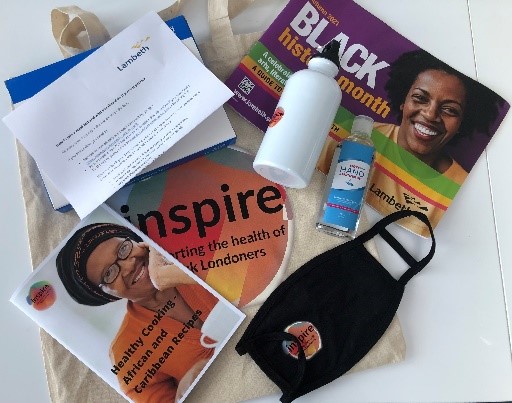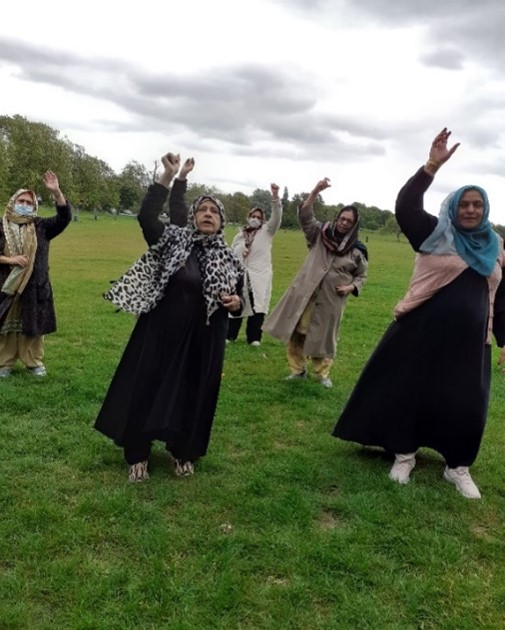What do we mean by equality, diversity and inclusion?
As partners delivering local health and care services, we have duties to prevent and tackle unfair discrimination towards patients, service users and staff and to advance equality of opportunity and foster good relations between people who have characteristics that are protected under the law. These characteristics are age, disability, gender reassignment, marriage or civil partnership, pregnancy/maternity, race, religion/belief, sex (gender) and or/sexual orientation. We also have an ambition to tackle health inequalities – that is, to reduce unfair and avoidable differences in health between different groups of people.
Equality, diversity and inclusion are different issues that intertwine, and all must be considered to avoid discrimination, promote good relations and tackle health inequalities.
Equality
Equality means making sure that everyone is treated fairly and with dignity and respect. The Lambeth Together Equality, Diversity and Inclusion programme focuses on how we address concerns, remove barriers and create a healthier borough where everyone has equal access to health and care services, equal treatment within our services and equal opportunities to enjoy the best of health. We know that some groups of people are impacted by long term health conditions far earlier than others. For example, a Black Caribbean man living in Lambeth is likely to experience his first long term condition 10 years earlier than his White British counterpart. A man in Lambeth can on average expect to live three years less in good health than a woman. We describe these unfair and avoidable differences as health inequalities.
Diversity
Diversity is about individuality and recognising the characteristics that make us all different. These include age, gender, background, nationality and health. To support and promote an environment that welcomes and values diversity, the Lambeth Together EDI Working Group will be working on recruitment and retention, and training and development across our partnership, to ensure our workforces are as diverse as the Lambeth community itself and to increase diversity in our leadership.
Inclusion
Inclusion is about being included, valued and accepted. In Lambeth, we work together to give Lambeth residents equal access to opportunities and services and, when necessary, making reasonable adjustments to enable participation and give all residents a chance to be heard.
The Lambeth Together Equality, Diversity and Inclusion
Who we are
The Lambeth Together Equality, Diversity and Inclusion Working Group is responsible for delivering and monitoring our work to improve equality, diversity and inclusion across the Partnership.
The group is co-chaired by Juliet Amoa, Associate Director, Community Health and Engagement, Lambeth Council, and Dr Di Aitken, Lambeth GP, and Co-Chair of Lambeth Together Care Partnership Board. It has members from all organisations within the Lambeth Together Partnership.
What we do
In the Equality, Diversity and Inclusion Working Group we aim to support the Lambeth Together partnership to reduce unfair and avoidable differences in health between different groups of people within our community – for example between people who have a disability and people who do not, or between white people and people from multi-ethnic communities. These are often referred to as ‘health inequalities’. We also consider what Lambeth Together could do to tackle wider issues that impact on people’s health, such as debt or food poverty. This will help create a better future for all our residents.
At the heart of all our projects is a focus on eliminating discrimination and promoting equality in relation to age, disability, gender reassignment, marriage/civil partnership and same sex marriage, pregnancy and maternity/paternity, race, religion or belief, sex and sexual orientation (groups that are protected by the Equality Act). We do this by ensuring that equality, diversity and inclusion is considered routinely in how services are designed, delivered and assessed for success.
We also coordinate funding bids to tackle unfair and avoidable differences in health between different groups of people, focusing on specific areas of need.
Examples of our work
The Lambeth Together Equality, Diversity and Inclusion Working Group supports initiatives and events such as the Black Londoners Health and Wellbeing Day, held in October 2021. The aim of this event was to promote health and provide prevention support to Black communities in Lambeth. We co-designed this with the voluntary and community sector, health professionals and community leaders, supported by Public Health England and the Greater London Authority. It received excellent feedback and engagement, with over 500 community members attending.

The Lambeth Together Equality Diversity and Inclusion Working Group has been involved in an advisory capacity on initiatives such as:
- Pride in Practice, where Lambeth GP surgeries are trained to provide effective healthcare support to people in LGBTQ+ communities
- Safer Surgeries, where refugees and asylum seekers can receive healthcare support regardless of immigration status from doctors at Lambeth surgeries
- The South London Women’s Group, which supports health and wellbeing in the South London Islamic Centre (Streatham Mosque). The project aims to reduce health inequalities by providing a space where women can take part in exercise and learn about healthy eating with the hope to also tackle social isolation.
- Reviewing the Lambeth Together Pledge, ensuring it has a clear focus on Equality, Diversity and Inclusion.

Our current priorities
Currently we’re exploring how the Lambeth Together EDI Working Group can support the reduction of health inequalities in areas such as maternity services for Black, Asian and Multi-Ethnic communities.
We’re also looking at health inequalities experienced in people diagnosed with severe mental illness, chronic respiratory disease, high blood pressure, diabetes, chronic pain and among people who receive a cancer diagnosis.
We know that the COVID-19 Pandemic has highlighted and worsened inequalities across South East London, with some people having less ability to access support and services than others, which has impacted disproportionately on the health and wellbeing of certain communities. The Lambeth Together EDI Working Group builds on existing work to share knowledge, good practice and use data to identify, monitor and reduce the negative impact of health inequalities in Lambeth.